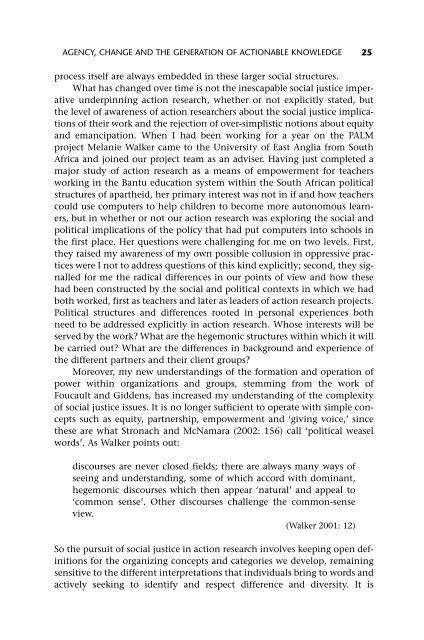Action Research A Methodology for Change and Development
Action Research A Methodology for Change and Development
Action Research A Methodology for Change and Development
You also want an ePaper? Increase the reach of your titles
YUMPU automatically turns print PDFs into web optimized ePapers that Google loves.
AGENCY, CHANGE AND THE GENERATION OF ACTIONABLE KNOWLEDGE 25<br />
process itself are always embedded in these larger social structures.<br />
What has changed over time is not the inescapable social justice imperative<br />
underpinning action research, whether or not explicitly stated, but<br />
the level of awareness of action researchers about the social justice implications<br />
of their work <strong>and</strong> the rejection of over-simplistic notions about equity<br />
<strong>and</strong> emancipation. When I had been working <strong>for</strong> a year on the PALM<br />
project Melanie Walker came to the University of East Anglia from South<br />
Africa <strong>and</strong> joined our project team as an adviser. Having just completed a<br />
major study of action research as a means of empowerment <strong>for</strong> teachers<br />
working in the Bantu education system within the South African political<br />
structures of apartheid, her primary interest was not in if <strong>and</strong> how teachers<br />
could use computers to help children to become more autonomous learners,<br />
but in whether or not our action research was exploring the social <strong>and</strong><br />
political implications of the policy that had put computers into schools in<br />
the first place. Her questions were challenging <strong>for</strong> me on two levels. First,<br />
they raised my awareness of my own possible collusion in oppressive practices<br />
were I not to address questions of this kind explicitly; second, they signalled<br />
<strong>for</strong> me the radical differences in our points of view <strong>and</strong> how these<br />
had been constructed by the social <strong>and</strong> political contexts in which we had<br />
both worked, first as teachers <strong>and</strong> later as leaders of action research projects.<br />
Political structures <strong>and</strong> differences rooted in personal experiences both<br />
need to be addressed explicitly in action research. Whose interests will be<br />
served by the work? What are the hegemonic structures within which it will<br />
be carried out? What are the differences in background <strong>and</strong> experience of<br />
the different partners <strong>and</strong> their client groups?<br />
Moreover, my new underst<strong>and</strong>ings of the <strong>for</strong>mation <strong>and</strong> operation of<br />
power within organizations <strong>and</strong> groups, stemming from the work of<br />
Foucault <strong>and</strong> Giddens, has increased my underst<strong>and</strong>ing of the complexity<br />
of social justice issues. It is no longer sufficient to operate with simple concepts<br />
such as equity, partnership, empowerment <strong>and</strong> ‘giving voice,’ since<br />
these are what Stronach <strong>and</strong> McNamara (2002: 156) call ‘political weasel<br />
words’. As Walker points out:<br />
discourses are never closed fields; there are always many ways of<br />
seeing <strong>and</strong> underst<strong>and</strong>ing, some of which accord with dominant,<br />
hegemonic discourses which then appear ‘natural’ <strong>and</strong> appeal to<br />
‘common sense’. Other discourses challenge the common-sense<br />
view.<br />
(Walker 2001: 12)<br />
So the pursuit of social justice in action research involves keeping open definitions<br />
<strong>for</strong> the organizing concepts <strong>and</strong> categories we develop, remaining<br />
sensitive to the different interpretations that individuals bring to words <strong>and</strong><br />
actively seeking to identify <strong>and</strong> respect difference <strong>and</strong> diversity. It is

















